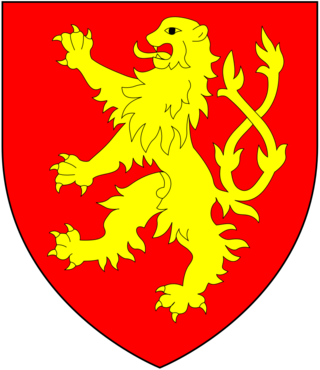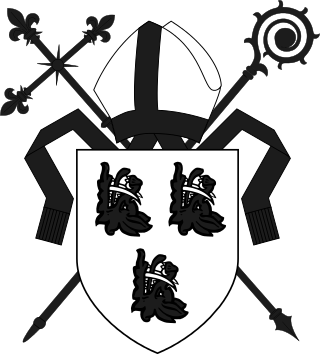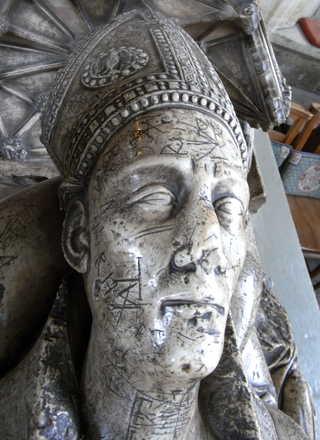Thomas Charlton was Bishop of Hereford, Lord High Treasurer of England, Lord Privy Seal, and Lord Chancellor of Ireland. He is buried in Hereford Cathedral in Hereford, Herefordshire, England.
Marmaduke Lumley was an English priest, Bishop of Carlisle from 1429 to 1450, and Knight Commander of the Order of St. John of Jerusalem. He was a son of Ralph de Lumley, 1st Baron Lumley and Eleanor de Neville. He was elected about 5 December 1429, and consecrated on 16 April 1430. He was Bishop of Lincoln for a short time before his death in December 1450. He was educated at University of Cambridge and was appointed Precentor of Lincoln Cathedral in 1425. He also became Chancellor of the University of Cambridge in 1427 and was Master of Trinity Hall, Cambridge from 1429 to 1443. From 1446 to 1449 he served as Lord High Treasurer of England. Lumley's tenure as Lord High Treasurer occurred during the Great Bullion Famine and the Great Slump in England.

Henry Burghersh, was Bishop of Lincoln (1320-1340) and served as Lord Chancellor of England (1328–1330). He was a younger son of Robert de Burghersh, 1st Baron Burghersh, and a nephew of Bartholomew de Badlesmere, 1st Baron Badlesmere. He was educated in France.
Henry Wingham was a Lord Chancellor of England and Bishop of London.
John Chishull or John de Chishull was Lord Chancellor of England, Bishop of London, and Lord High Treasurer during the 13th century. He also served as Dean of St Paul's.
Richard de Luci was first noted as High Sheriff of Essex, after which he was made Chief Justiciar of England.
Eustace of Fauconberg was a medieval English Bishop of London from 1221 to 1228 and was also Lord High Treasurer.
William Alnwick was an English Catholic clergyman. He was Bishop of Norwich (1426–1436) and Bishop of Lincoln (1436–1449).

Lawrence Booth served as Prince-Bishop of Durham and Lord Chancellor of England, before being appointed Archbishop of York.
Thomas Langley was an English prelate who held high ecclesiastical and political offices in the early to mid-15th century. He was Dean of York, Bishop of Durham, twice Lord Chancellor of England to three kings, and a Pseudocardinal. In turn Keeper of the King's signet and Keeper of the Privy Seal before becoming de facto England's first Foreign Secretary. He was the second longest serving Chancellor of the Middle Ages.
Simon of Wells was a medieval Bishop of Chichester.

Hugh de Pateshull was a medieval Bishop of Coventry and Lichfield.
William Grey was a medieval English churchman, academic, and Lord High Treasurer. He served as Chancellor of Oxford University and as Bishop of Ely.

Edmund Stafford was Bishop of Exeter from 1395 to his death in 1419.

John Bokyngham was a medieval treasury official and Bishop of Lincoln.
William Grey was Bishop of London and then Bishop of Lincoln.

Richard FitzJames was an English academic and administrator who became successively Bishop of Rochester, Bishop of Chichester, and Bishop of London.

Gilbert de Lacy was a medieval Anglo-Norman baron in England, the grandson of Walter de Lacy who died in 1085. Gilbert's father forfeited his English lands in 1096, and Gilbert initially only inherited the lands in Normandy. The younger de Lacy spent much of his life trying to recover his father's English lands, and eventually succeeded. Around 1158, de Lacy became a Templar and went to the Holy Land, where he was one of the commanders against Nur ad-Din in the early 1160s. He died after 1163.
David FitzGerald was a medieval Bishop of St David's in Wales.
Dive Downes was Bishop of Cork and Ross from 1699 to 1709.







